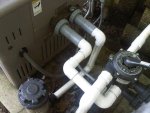I purchased a home with a wonderful pool - a first for me, last year. I have a hayward heater that is probably at least 10 years old if not 15. Looks like it hasnt been in use for at least 3 or 4 years. I did not have it started up last year as the service company advised the power did not work - bad shutoff switch as I determined and corrected later. Turns out several terminals have rusted off on things like the flame rollout sensor as well. I chose not to repair it last season based on a verbal estimate of $300 just to clean it up and replace the things visibly wrong under the access panel. I had the pool professionally closed last year. Fast forward to pool opening this year. After having the service company come out to open, and advise me again that the best course would be to replace heater versus repair. Later that evening I see it is leaking! I found a temperature sensor (?I believe) that was dripping and tightened it up. Still no luck, lots of dripping going on in the rear somewhere.
I don't want to make a $2000 purchase and install decision on the fly and am not certain I want or need a heater. Not knowing the life expectancy of heaters, but assuming it is somewhere around 8 or 9 years, my questions are:
- Should I consider having the pool company come out to diagnose and maybe repair the water leak $(90 service call + materials) or should I simply cut the lines and bypass the heater myself?
- If I bypass it myself, are there any potential pitfalls? I assume this is just a simple install of some schedule 40 pipe, a couple of unions and one 90 degree. Is there anything I can screw up by taking the heater out of service?
I don't want to make a $2000 purchase and install decision on the fly and am not certain I want or need a heater. Not knowing the life expectancy of heaters, but assuming it is somewhere around 8 or 9 years, my questions are:
- Should I consider having the pool company come out to diagnose and maybe repair the water leak $(90 service call + materials) or should I simply cut the lines and bypass the heater myself?
- If I bypass it myself, are there any potential pitfalls? I assume this is just a simple install of some schedule 40 pipe, a couple of unions and one 90 degree. Is there anything I can screw up by taking the heater out of service?


